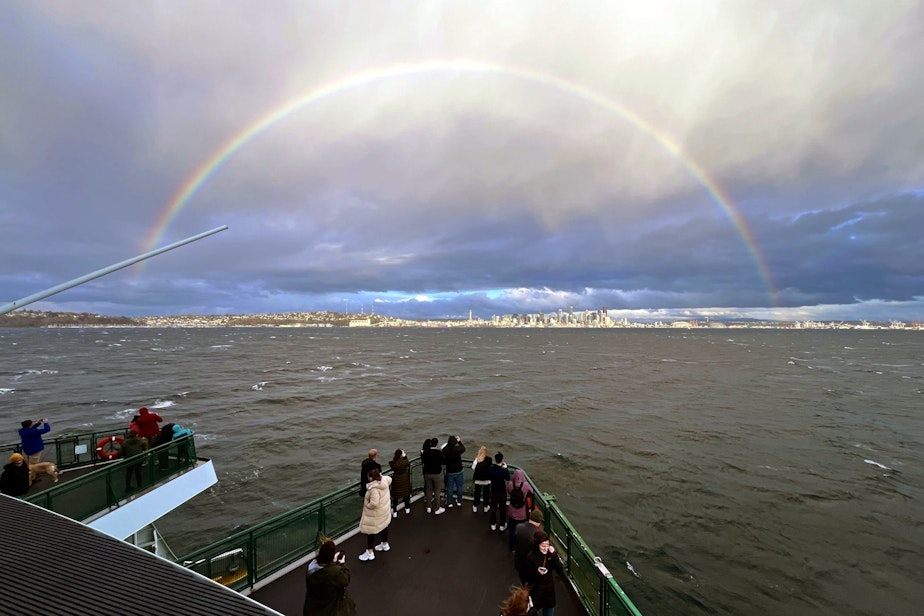Full ferry service returning to Puget Sound for summer 2025, Washington Gov. Ferguson says

After years of low staffing and unreliable schedules, Gov. Bob Ferguson announced Thursday that Washington state will have full ferry service by summer, bringing the system back to pre-pandemic levels.
"This won't just be happening with getting more vessels in the water, but also importantly, to make sure we're addressing issues with the important folks who are the backbone of our service, the crew... to make sure they have the resources they need and the compensation they deserve," Ferguson said at a press event held at the Bremerton ferry terminal.
RELATED: 'Mosquito Fleet Act' could bring small ferries to more Puget Sound communities
Bringing the ferry system to pre-pandemic levels will come at the sacrifice of upgrading two of the state's largest vessels. Plans to convert them to hybrid-electric engines is now on hold until further notice. The governor is also pressing for a budget that will fully fund ferry crews to keep all boats sailing on time.
Ferguson was joined by Bremerton Mayor Greg Wheeler, who noted how much people in cities like his rely on the ferry for work, medical appointments, and other essential travel.
"We are a ferry-dependent community, and the ferry system plays a vital role in the lives of our residents, our workforce, and supports our economy," Wheeler said.
Despite the "vital role" ferries play in communities up and down the Puget Sound, the system has been plagued by low staffing and frequent cancelations ever since the pandemic struck in 2020. Ferguson, however, is adamant that the system will return to pre-pandemic operations by summer 2025, when tourism season means an uptick in ridership.

Another motivation for the push to get the ferries back in order is the World Cup's arrival in Seattle in summer 2026.
"We have a World Cup coming up, and that is going to put strain on the system," Ferguson said. "Literally, it's one of the biggest events in the world, and we need to be prepared for that on many levels. And that includes our transportation system, which, of course, includes our ferry system."
To get back to full service, the state is addressing two issues: the number of vessels on routes and staffing.
Full ferry service by June 2025
One of the system's largest ferries, the MV Wenatchee, has been out of the mix for nearly two years for an upgrade to a hybrid-electric engine. It's about n $36 million over budget, according to the ferries. It is now slated to return to service in June and will become the state's first hybrid-electric ferry. The state had planned to convert two other ferries, but those plans are now on hold. The vessels will continue to run normal routes.
RELATED: The tricky business of charging Washington's coming hybrid electric ferries
"What used to be one of our fleet's biggest polluters [MV Wenatchee] will soon be our cleanest ferry, providing a model for the future of clean transportation," Ferguson said. "At the same time, of course, we are going to delay the conversion of the other two large ferries. I made that decision to delay that conversion for a very simple reason, and that is to restore our domestic service to pre-pandemic levels."
With the Wenatchee back in service for summer 2025, and the delayed conversions, Washington state will have 18 boats serving routes throughout Puget Sound (21 boats total, but the state accounts for having three out of service for maintenance at any given time). This is the first time since 2019 that WSF has had as many boats in the water, the governor said.
The two ferries slated for a conversion to hybrid-electric are Jumbo MKII models, which are the largest in the fleet. They serve the busiest routes. The timeline for their hybrid conversion will be revisited after the World Cup in summer 2026, Ferguson said. It is estimated that this conversion cold take between 12 and 16 months, but the governor thinks that timing could be improved.
WSF will also begin the process of obtaining five new hybrid-electric ferries this year. Bids will open in April. The state hopes to have a contract with at least one bidder by June. These ferries won't be in service until 2029.

When those new hybrid ferries arrive, WSF will retire existing vessels. After that, the state will need to replace another 11 ferries before 2040. The governor said he has instructed WSF to "explore innovative options" to get vessels faster. One such option is to lease ferry boats with the intention of purchasing them later.
Washington State Ferry staffing
While admitting Washington state currently has a budget crisis, Ferguson said he is not willing to sacrifice funding for ferry crews.
"Any budget that I sign must honor and maintain competitive collective bargain agreements," Ferguson said. "Those collective bargain agreements include over $20 million in compensation for all ferry workers. I want to be clear: That has got to be a part of the budget that I sign. We have got to have that to maintain the service."
RELATED: Puget Sound is the classroom for students at Maritime High School
Ferguson also announced Thursday that he is promoting Steve Nevey from assistance secretary for Washington State Ferries to deputy transportation secretary.
According to Nevey, WSF is back to pre-pandemic staffing levels. This was accomplished through a handful of programs. One program advanced existing crew members to higher positions. Another offered scholarships to a year and a half maritime course that fast tracked new crew members. Previously, staff had to pay for these programs themselves and take classes on their own time. WSF paid for these programs.
Nevey noted that in the first two months of 2023, WSF cancelled 147 sailings. In the first two months of 2025, it cancelled 42. While the system is under-resourced, he said, the state is doing the best with the resources it has.




